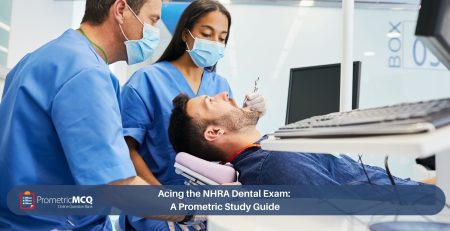
Top Tips for Passing Your NHRA Prometric Exam in 2025
fatima@prometricmcq.com2025-09-18T20:21:38+00:00Table of Contents
ToggleTop Tips for Passing Your NHRA Prometric Exam in 2025
The National Health Regulatory Authority (NHRA) Prometric Exam is the essential qualification for any healthcare professional wishing to practice in the Kingdom of Bahrain. It is a comprehensive, high-stakes examination designed to verify that your clinical skills and knowledge meet the country’s rigorous standards of care. Passing this exam is not just about what you know; it’s about how effectively you can apply that knowledge under pressure. The path to success is paved not with last-minute cramming, but with strategic, intelligent, and consistent preparation.
Candidates often feel overwhelmed by the sheer volume of information they need to master. However, the secret to conquering the NHRA exam lies in a collection of proven strategies and targeted techniques. It’s about understanding the exam’s psychology, mastering the art of MCQ deconstruction, managing your time effectively, and building the mental endurance required for a three-hour, high-concentration test. The difference between a “Pass” and a “Fail” often comes down to the quality of your preparation strategy.
This ultimate 2025 guide is engineered to be your strategic playbook for passing the NHRA Prometric exam. We will go beyond a simple content outline and provide you with the top actionable tips that successful candidates use to ensure a first-attempt pass. From creating the perfect study plan to mastering exam-day logistics, this guide covers every angle. It includes a comprehensive 10-point FAQ section to provide definitive answers to your most pressing questions. This is your roadmap to turning exam anxiety into exam confidence.
Top 5 Quick Tips for NHRA Success
- Tip #1: Understand the Blueprint: Know the specific syllabus, question count, and duration for your profession. Don’t start studying without a map.
- Tip #2: Make QBanks Your Primary Tool: Shift from passive reading to active problem-solving with a high-quality MCQ question bank. This is the single most effective study method.
- Tip #3: Simulate the Real Exam: Regularly take full-length, timed mock exams to perfect your pacing and build mental stamina.
- Tip #4: Don’t Ignore Bahrain Law: Dedicate specific time to studying the rules and regulations published on the official NHRA website. These are guaranteed marks.
- Tip #5: Practice Smart Time Management: On exam day, don’t get stuck. If a question is too hard, flag it and move on. Answer every single question.
Tip 1: Deconstruct Your Specific Exam Blueprint
Before you read a single page or answer a single question, your first step must be to thoroughly understand the specific exam blueprint for your profession. The NHRA exams are not one-size-fits-all. The content, emphasis, and even the number of questions can vary. A clear understanding of your exam is fundamental to any effective Bahrain NHRA exam preparation.
How to Find and Use Your Blueprint:
- Visit the NHRA Website: The official NHRA portal is the primary source for the syllabus or “competency framework” for each profession.
- Identify Core Domains: Analyze the main subject areas and their approximate weightage. For example, a nurse will see a heavy emphasis on Patient Safety and Fundamentals, while a GP will see a focus on Internal Medicine and Diagnosis.
- Create a Checklist: Turn the blueprint into a personal study checklist. As you cover each topic, tick it off. This provides a sense of progress and ensures you don’t miss any critical areas.
Studying without a blueprint is like trying to navigate a new city without a map. You might eventually get there, but you’ll waste a lot of time and energy along the way.
Tip 2: Build a Phased, Realistic Study Plan
A goal without a plan is just a wish. A 3000-page textbook can be intimidating, but a well-structured study plan breaks the mammoth task into manageable daily and weekly goals. The most effective plans are typically phased.
The Three-Phase Study Plan:
- Phase 1: Foundational Review (4-6 weeks): This phase is about rebuilding your core knowledge. Dedicate each week to a major subject area from your blueprint (e.g., Week 1: Cardiology, Week 2: Pulmonology). Use your core textbooks to gain a deep understanding of the concepts.
- Phase 2: Intensive MCQ Practice (4-6 weeks): This is the most crucial phase. Shift your focus from reading to doing. Subscribe to a high-quality QBank and aim to solve 50-100 questions per day. Focus on “Tutor Mode” to learn from the detailed rationales.
- Phase 3: Integration & Simulation (2-3 weeks): In the final weeks, switch to “Timed Mode” in your QBank. Take full-length (150-question) mock exams to simulate the real test environment. Use the results to identify and patch up your remaining weak areas.
Tip 3: Master the Art of Answering MCQs
The NHRA exam is a test of your ability to answer MCQs correctly and efficiently. Knowing the information is only half the battle; you must also be a skilled test-taker.
Key MCQ Strategies:
- Read the Stem Carefully: Before you even look at the options, make sure you understand exactly what the question is asking. Pay close attention to keywords like “most likely,” “best initial step,” “except,” and “not.”
- Formulate Your Own Answer First: Based on the information in the question stem, try to predict the answer in your own mind before reading the options. This helps you avoid being misled by tempting but incorrect distractors.
- Use the Process of Elimination: Even if you don’t know the correct answer immediately, you can often identify one or two options that are clearly wrong. Eliminating these significantly increases your odds of guessing correctly.
- Watch for Absolutes: Be wary of options that contain absolute words like “always,” “never,” or “all.” These are often incorrect because there are few absolutes in medicine.
Tip 4: Prioritize Active Recall Over Passive Reading
The biggest mistake candidates make is spending too much time passively reading textbooks and notes. Your brain retains information far more effectively when it is forced to actively retrieve it. This is the science behind why question banks are so effective.
How to Practice Active Recall:
- QBank Dominance: Make solving practice questions the core of your study, aiming for a 70/30 split between active practice and passive reading.
- The Feynman Technique: After studying a topic, try to explain it in simple terms, as if you were teaching it to someone else. If you can’t explain it simply, you don’t understand it well enough.
- Use Flashcards: For memorizing key facts like drug classes, lab values, or specific diagnostic criteria, flashcards (either physical or digital) are an excellent active recall tool.
Tip 5: Never Underestimate Bahrain Law and Ethics
Every NHRA exam, regardless of profession, will contain questions on the specific laws, regulations, and ethical guidelines of the Kingdom of Bahrain. These are often seen as “easy marks” for prepared candidates and “guaranteed lost marks” for those who neglect them.
Your Action Plan for Law and Ethics:
- Bookmark the NHRA Website: Make the official NHRA website your go-to source. Do not rely on second-hand information.
- Download Key Documents: Look for official circulars, guidelines on prescribing controlled drugs, patient consent policies, and codes of professional conduct.
- Make Summary Notes: Condense the key legal points onto a few pages of summary notes. Review these notes once a week until they are committed to memory.
Frequently Asked Questions (FAQs) for the NHRA Prometric Exam
The single most effective strategy is to make a high-quality, timed question bank the center of your study plan. Consistent practice with exam-style MCQs that have detailed rationales is the key to mastering both the content and the format of the test.
First, calculate your time per question (180 mins / 150 Qs = 1.2 mins/Q). Aim to answer questions you know immediately in under a minute. For harder questions, spend no more than 1.5-2 minutes. If you’re still stuck, use the “flag for review” feature and move on. Return to flagged questions at the end. Never leave a question blank.
Immediately raise your hand and notify the Test Center Administrator (TCA). Do not try to fix the issue yourself or wait for it to resolve. The TCA is trained to handle technical problems, and they will log the incident, which is important if the issue significantly impacts your time.
This depends on your learning style. A combination is often best. Study alone for deep content review and individual QBank practice. Form a small study group (2-3 people) to meet once a week to discuss difficult concepts and review challenging questions. Explaining a topic to others is a powerful way to solidify your own understanding.
Set small, achievable weekly goals and reward yourself for meeting them. Track your progress (e.g., your improving QBank scores) to see tangible results. Remind yourself of your ultimate goal: a successful healthcare career in Bahrain. Most importantly, schedule regular breaks and at least one full day off per week to avoid burnout.
The most common mistakes are poor time management (getting stuck on a few hard questions), not reading the question stem carefully, and changing answers due to self-doubt. Trust your initial informed gut instinct unless you have a clear, logical reason to change your answer.
Aim for a full 7-8 hours of quality sleep. Sleep is critical for memory consolidation and cognitive performance. Avoid the temptation to pull an all-nighter to cram; this is counterproductive and will harm your performance far more than it will help.
During the initial tutorial period (before the exam timer starts), you are often given a blank sheet or whiteboard. You can use this time to quickly jot down key formulas, lab values, or mnemonics that you have memorized. This “brain dump” can reduce anxiety and serve as a quick reference during the test.
The official Prometric website is your definitive source. You can find information about what to expect on test day, identification requirements, permitted items, and the location of your specific test center. Reviewing this information a week before your exam is highly recommended.
It is crucial to use a trusted source that offers questions tailored to the NHRA blueprint for your specific profession. A comprehensive platform with dedicated question banks for various specialties is your most valuable asset. You can find a wide selection on the MCQs Packages page.
Conclusion: Your Strategy is Your Strength
The NHRA Prometric Exam is a marathon, not a sprint. Success is not a matter of luck; it is the predictable result of a well-planned, strategic, and disciplined preparation process. By deconstructing the exam blueprint, building a realistic study plan, and making active, MCQ-based learning the heart of your strategy, you are taking control of your outcome. Implement the tips in this guide, maintain your focus, and you will not only pass the exam but will do so with the confidence that comes from being truly prepared. Your rewarding career in Bahrain’s esteemed healthcare sector awaits.
Ready to Put These Tips into Action?
Our premium MCQ packages are designed to perfectly simulate the NHRA Prometric exam experience for every profession. With thousands of high-yield questions and detailed rationales, they are the key to your first-attempt success.










